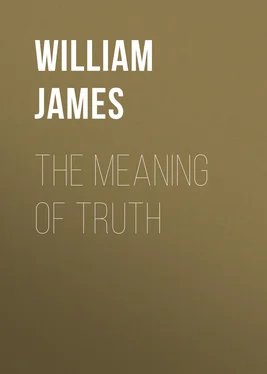William James - The Meaning of Truth
Здесь есть возможность читать онлайн «William James - The Meaning of Truth» — ознакомительный отрывок электронной книги совершенно бесплатно, а после прочтения отрывка купить полную версию. В некоторых случаях можно слушать аудио, скачать через торрент в формате fb2 и присутствует краткое содержание. Жанр: foreign_antique, Философия, foreign_edu, на английском языке. Описание произведения, (предисловие) а так же отзывы посетителей доступны на портале библиотеки ЛибКат.
- Название:The Meaning of Truth
- Автор:
- Жанр:
- Год:неизвестен
- ISBN:нет данных
- Рейтинг книги:3 / 5. Голосов: 1
-
Избранное:Добавить в избранное
- Отзывы:
-
Ваша оценка:
- 60
- 1
- 2
- 3
- 4
- 5
The Meaning of Truth: краткое содержание, описание и аннотация
Предлагаем к чтению аннотацию, описание, краткое содержание или предисловие (зависит от того, что написал сам автор книги «The Meaning of Truth»). Если вы не нашли необходимую информацию о книге — напишите в комментариях, мы постараемся отыскать её.
The Meaning of Truth — читать онлайн ознакомительный отрывок
Ниже представлен текст книги, разбитый по страницам. Система сохранения места последней прочитанной страницы, позволяет с удобством читать онлайн бесплатно книгу «The Meaning of Truth», без необходимости каждый раз заново искать на чём Вы остановились. Поставьте закладку, и сможете в любой момент перейти на страницу, на которой закончили чтение.
Интервал:
Закладка:
I hope you may agree with me now that in representative knowledge there is no special inner mystery, but only an outer chain of physical or mental intermediaries connecting thought and thing. TO KNOW AN OBJECT IS HERE TO LEAD TO IT THROUGH A CONTEXT WHICH THE WORLD SUPPLIES. All this was most instructively set forth by our colleague D. S. Miller at our meeting in New York last Christmas, and for re-confirming my sometime wavering opinion, I owe him this acknowledgment. [Footnote: See Dr. Miller's articles on Truth and Error, and on Content and Function, in the Philosophical Review, July, 1893, and Nov., 1895.]
Let us next pass on to the case of immediate or intuitive acquaintance with an object, and let the object be the white paper before our eyes. The thought-stuff and the thing-stuff are here indistinguishably the same in nature, as we saw a moment since, and there is no context of intermediaries or associates to stand between and separate the thought and thing. There is no 'presence in absence' here, and no 'pointing,' but rather an allround embracing of the paper by the thought; and it is clear that the knowing cannot now be explained exactly as it was when the tigers were its object. Dotted all through our experience are states of immediate acquaintance just like this. Somewhere our belief always does rest on ultimate data like the whiteness, smoothness, or squareness of this paper. Whether such qualities be truly ultimate aspects of being, or only provisional suppositions of ours, held-to till we get better informed, is quite immaterial for our present inquiry. So long as it is believed in, we see our object face to face. What now do we mean by 'knowing' such a sort of object as this? For this is also the way in which we should know the tiger if our conceptual idea of him were to terminate by having led us to his lair?
This address must not become too long, so I must give my answer in the fewest words. And let me first say this: So far as the white paper or other ultimate datum of our experience is considered to enter also into some one else's experience, and we, in knowing it, are held to know it there as well as here; so far, again, as it is considered to be a mere mask for hidden molecules that other now impossible experiences of our own might some day lay bare to view; so far it is a case of tigers in India again—the things known being absent experiences, the knowing can only consist in passing smoothly towards them through the intermediary context that the world supplies. But if our own private vision of the paper be considered in abstraction from every other event, as if it constituted by itself the universe (and it might perfectly well do so, for aught we can understand to the contrary), then the paper seen and the seeing of it are only two names for one indivisible fact which, properly named, is THE DATUM, THE PHENOMENON, OR THE EXPERIENCE. The paper is in the mind and the mind is around the paper, because paper and mind are only two names that are given later to the one experience, when, taken in a larger world of which it forms a part, its connections are traced in different directions. [Footnote: What is meant by this is that 'the experience' can be referred to either of two great associative systems, that of the experiencer's mental history, or that of the experienced facts of the world. Of both of these systems it forms part, and may be regarded, indeed, as one of their points of intersection. One might let a vertical line stand for the mental history; but the same object, O, appears also in the mental history of different persons, represented by the other vertical lines. It thus ceases to be the private property of one experience, and becomes, so to speak, a shared or public thing. We can track its outer history in this way, and represent it by the horizontal line. (It is also known representatively at other points of the vertical lines, or intuitively there again, so that the line of its outer history would have to be looped and wandering, but I make it straight for simplicity's sake.)] In any case, however, it is the same stuff figures in all the sets of lines.
TO KNOW IMMEDIATELY, THEN, OR INTUITIVELY, IS FOR MENTAL CONTENT AND OBJECT TO BE IDENTICAL. This is a very different definition from that which we gave of representative knowledge; but neither definition involves those mysterious notions of self-transcendency and presence in absence which are such essential parts of the ideas of knowledge, both of philosophers and of common men. [Footnote: The reader will observe that the text is written from the point of view of NAIF realism or common sense, and avoids raising the idealistic controversy.]
III
HUMANISM AND TRUTH [Footnote: Reprinted, with slight verbal revision, from Mind, vol. xiii, N. S., p. 457 (October, 1904). A couple of interpolations from another article in Mind, 'Humanism and truth once more,' in vol. xiv, have been made.]
RECEIVING from the Editor of Mind an advance proof of Mr. Bradley's article on 'Truth and Practice,' I understand this as a hint to me to join in the controversy over 'Pragmatism' which seems to have seriously begun. As my name has been coupled with the movement, I deem it wise to take the hint, the more so as in some quarters greater credit has been given me than I deserve, and probably undeserved discredit in other quarters falls also to my lot.
First, as to the word 'pragmatism.' I myself have only used the term to indicate a method of carrying on abstract discussion. The serious meaning of a concept, says Mr. Peirce, lies in the concrete difference to some one which its being true will make. Strive to bring all debated conceptions to that' pragmatic' test, and you will escape vain wrangling: if it can make no practical difference which of two statements be true, then they are really one statement in two verbal forms; if it can make no practical difference whether a given statement be true or false, then the statement has no real meaning. In neither case is there anything fit to quarrel about: we may save our breath, and pass to more important things.
All that the pragmatic method implies, then, is that truths should HAVE practical [Footnote: 'Practical' in the sense of PARTICULAR, of course, not in the sense that the consequences may not be MENTAL as well as physical.] consequences. In England the word has been used more broadly still, to cover the notion that the truth of any statement CONSISTS in the consequences, and particularly in their being good consequences. Here we get beyond affairs of method altogether; and since my pragmatism and this wider pragmatism are so different, and both are important enough to have different names, I think that Mr. Schiller's proposal to call the wider pragmatism by the name of 'humanism' is excellent and ought to be adopted. The narrower pragmatism may still be spoken of as the 'pragmatic method.'
I have read in the past six months many hostile reviews of Schiller's and Dewey's publications; but with the exception of Mr. Bradley's elaborate indictment, they are out of reach where I write, and I have largely forgotten them. I think that a free discussion of the subject on my part would in any case be more useful than a polemic attempt at rebutting these criticisms in detail. Mr. Bradley in particular can be taken care of by Mr. Schiller. He repeatedly confesses himself unable to comprehend Schiller's views, he evidently has not sought to do so sympathetically, and I deeply regret to say that his laborious article throws, for my mind, absolutely no useful light upon the subject. It seems to me on the whole an IGNORATIO ELENCHI, and I feel free to disregard it altogether.
The subject is unquestionably difficult. Messrs. Dewey's and Schiller's thought is eminently an induction, a generalization working itself free from all sorts of entangling particulars. If true, it involves much restatement of traditional notions. This is a kind of intellectual product that never attains a classic form of expression when first promulgated. The critic ought therefore not to be too sharp and logic-chopping in his dealings with it, but should weigh it as a whole, and especially weigh it against its possible alternatives. One should also try to apply it first to one instance, and then to another to see how it will work. It seems to me that it is emphatically not a case for instant execution, by conviction of intrinsic absurdity or of self-contradiction, or by caricature of what it would look like if reduced to skeleton shape. Humanism is in fact much more like one of those secular changes that come upon public opinion overnight, as it were, borne upon tides 'too deep for sound or foam,' that survive all the crudities and extravagances of their advocates, that you can pin to no one absolutely essential statement, nor kill by any one decisive stab.
Читать дальшеИнтервал:
Закладка:
Похожие книги на «The Meaning of Truth»
Представляем Вашему вниманию похожие книги на «The Meaning of Truth» списком для выбора. Мы отобрали схожую по названию и смыслу литературу в надежде предоставить читателям больше вариантов отыскать новые, интересные, ещё непрочитанные произведения.
Обсуждение, отзывы о книге «The Meaning of Truth» и просто собственные мнения читателей. Оставьте ваши комментарии, напишите, что Вы думаете о произведении, его смысле или главных героях. Укажите что конкретно понравилось, а что нет, и почему Вы так считаете.












